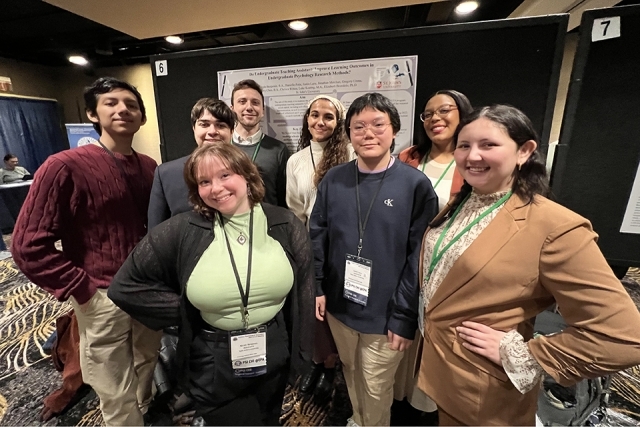
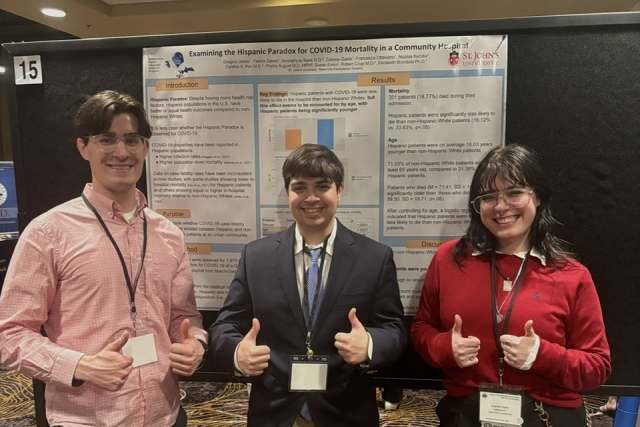
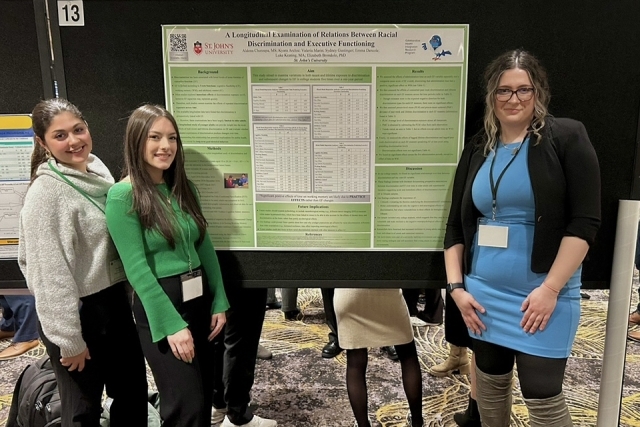
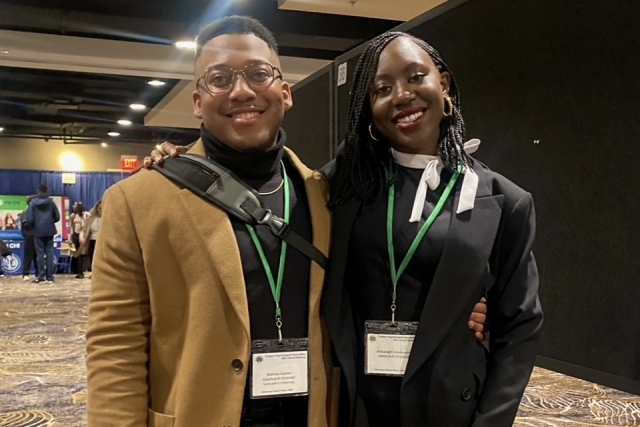
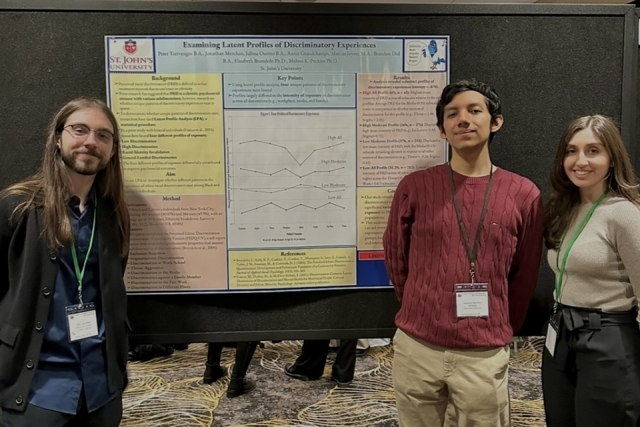
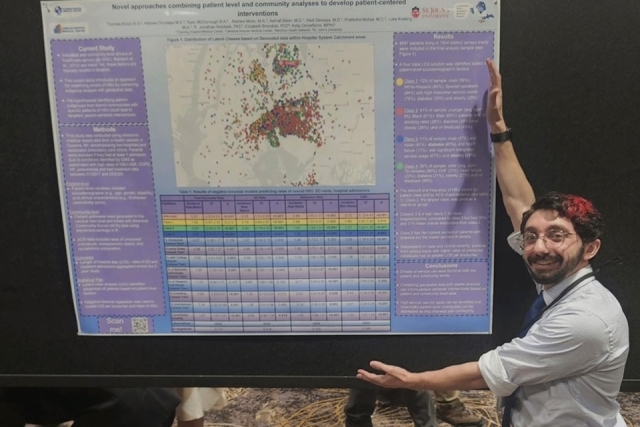
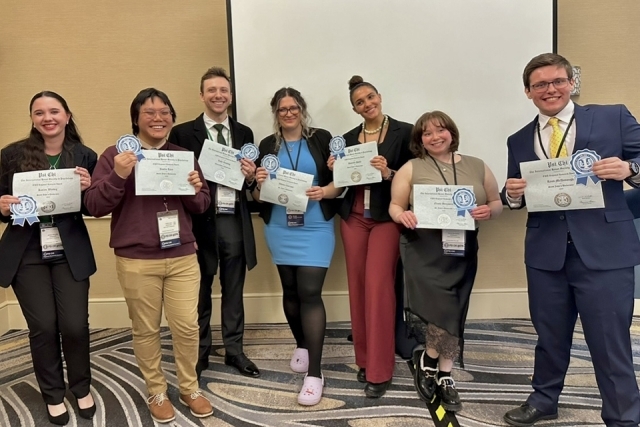







An impressive 16 out of 16 psychology students in St. John’s University’s Collaborative Health Integration Research Program (CHIRP) had their poster submissions accepted at the Eastern Psychological Association’s (EPA) annual conference, with seven of those papers receiving awards.
“I am incredibly proud of the CHIRP fellows. Each of them worked together and collaborated with our training partners to produce valuable research,” said Elizabeth Brondolo, Ph.D., Professor of Psychology, St. John’s College of Liberal Arts and Sciences, and Director of CHIRP. “Every single poster was accepted, and seven received the Psi Chi EPA Regional Research Award. CHIRP posters claimed just shy of half of the total awards given!”
CHIRP is a research training consortium in which St. John’s University partners with Jamaica Hospital Medical Center; Flushing Hospital Medical Center; and NewYork-Presbyterian Queens Hospital. Together with its hospital partners, CHIRP provides research opportunities and research training aimed at reducing health and health-care disparities. CHIRP fellows include undergraduate and graduate students in psychology and physician trainees and faculty who work collaboratively to provide a research base for efforts to improve health equity.
For their submissions to the EPA conference, CHIRP fellows’ research spanned the globe, including collaboration with Toan Khuc ’11G, ’14Psy.D., a St. John’s double alumnus and lecturer at Hanoi National University of Education. Together with Dr. Khuc, fellows explored the factors that can support teacher well-being in Vietnam, including workplace stress and noise pollution. Several award-winning posters came from this project. Other fellows examined the nature of moral injury among Italian health-care providers responding to COVID-19 to understand more about risk factors for burnout.
“Two of the award-winning posters investigated the effects of racial discrimination on neuropsychological functioning, and one of these studies came from our University-hospital partnerships,” Dr. Brondolo explained. “We also had one award-winning poster that presented a study about teaching research.”
As part of CHIRP training, fellows can serve as undergraduate Teaching Assistants (TA) for the Research Methods in Psychology class. According to Dr. Brondolo, incorporating these undergraduate teaching assistants has improved student outcomes.
Nicole Benjamin, a Psychology major who will earn her degree in May, was introduced to CHIRP by a TA for one of Dr. Brondolo’s courses. “It felt like the perfect opportunity to continue to expand upon the skills I was beginning to develop,” she said.
Her award-winning poster and research investigated the impact of Undergraduate TAs (UTAs) on learning outcomes in a psychology research methods course. “We measured gains in human and social capital, as well as rates of withdrawal, unofficial withdrawal, and course failure, revealing significant improvements after integrating UTAs,” she said. “Participating in the EPA conference was an enriching experience. The ability to present our research to other scientists together is incredibly gratifying.”
Danielle Potts, a senior in the University’s psychology program, explored how discrimination relates to three critical executive functioning abilities: cognitive flexibility, working memory, and inhibitory control.
“Research suggests that discrimination can impact these abilities, with one explanation being that experiencing discrimination is mentally taxing and consumes cognitive resources,” she explained. “Our study investigated three types of relational schemas (related to rejection/invalidation, mistrust, and social vigilance) as potential mediators between discrimination and executive functioning.”
Their findings supported their hypothesis, suggesting that relational patterns of thinking could explain some cognitive demands associated with discrimination.
At the conference, Gregory Urena, another senior in the University’s five-year B.A./M.A. Psychology program, presented his poster, “Examining the Hispanic Paradox for COVID-19 Mortality in a Community Hospital: A Complex Picture,” which explored mortality differences between Hispanic and non-Hispanic White patients with COVID-19 in a community hospital at the height of the pandemic. His research found that Hispanics have equal or better health outcomes compared to non-Hispanic Whites, despite having more disease risk factors.
“Being a part of an entire convention filled with people with like-minded interests from all walks of life was surreal,” Gregory added. “It proved to be an intellectually stimulating and enthralling experience, with some new ideas brainstorming as a result of the networking.”
